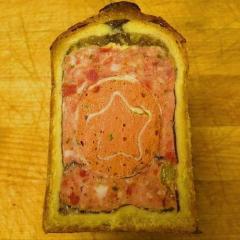The Maillard reaction is at least a bimolecular reaction (sugar, amino acids), in reality probably of an even higher order. Therefore, the speed of the reaction is proportional to the concentration of each of the reactants (“the more often they meet each other, the faster they can react”). So, the smart way is to employ your reactive mixture without additional dilution. Have you ever tried to brown a steak in a wet pan !?
18 minutes ago, FeChef said:Steam actually darkens bark faster.
Faster than ..? Faster than dry heat at the same heat transfer coefficient ? How do you compare and to what ?
18 minutes ago, FeChef said:For example, Katz Deli finishes their Pastrami in a steam bath. Look how dark the bark is on their pastrami.
First, I’d call that anecdotal evidence. Second, the bark on pastrami is comprised of herbs, spices and smoke. There is surely some Maillard going on, but as you have dismissed other ways to create a browned exterior upthread, I would not use that example here.






